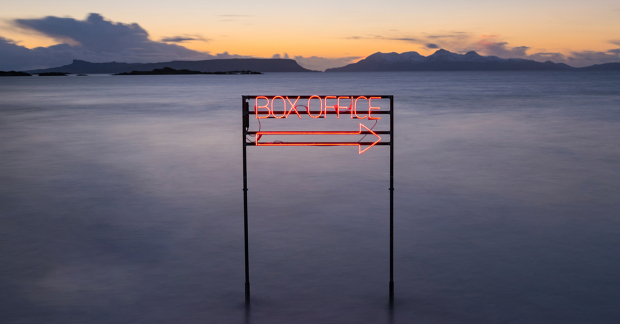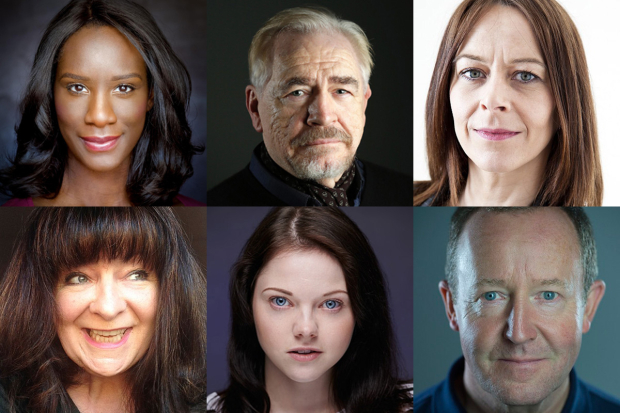Rehearsals via webcam, writers on the front line: how the National Theatre of Scotland created one of the most ambitious responses to the pandemic
Sarah Crompton watches as the company creates a series of pieces in reaction to the lockdown

© National Theatre Scotland
One of the great privileges of my working life has been being allowed into the room when professional rehearsals are taking place. That sudden glimpse behind the scenes has always felt like a revelation; watching a piece take shape doesn't alter the magic, it reinforces it. It takes so much skill to disguise the artifice in every performance.
I went to a rehearsal again this week. Sitting in my front room in London, I watched a team from the National Theatre of Scotland's Scenes for Survival begin work, from their own homes in Stirling and various parts of Glasgow. Six finished versions of the process are on BBC iPlayer and via the NTS's social media channels tonight, including short monologues by Ian Rankin (starring Brian Cox as Rebus), Janey Godley, and Stef Smith. All deal with our changed life under lockdown; all are produced and performed to the NTS's high standards.
The one I am watching will appear later in the run. It's called The Domestic, and written by Uma Nada-Rajah, who when she isn't writing, is working as a nurse on a Covid ward. The piece is a tangential look at the altered world in which we find ourselves, starring Kristi McDonald as a young woman who has tried to commit suicide.
It seems extraordinary that someone whose day job is so consuming would want to be part of such a process. But Nada-Rajah, who became involved with the NTS via a talent development scheme, feels it is exactly the right place to be. "When we look to our mobiles, we are bombarded with death tolls, exponential graphs, idle press conferences – none of which capture the complexity of the human experience, " she says. "This is the subject of drama."
At the rehearsal, conducted via Zoom, she's a watchful, helpful presence, her eyes flickering between her script and McDonald's intense performance. At the end of the first run through – engrossing but over-long – she immediately suggests and offers rewrites. Beth Morton, the director, top right on my screen, accepts some thoughts, weighs others. The most noticeable thing about the whole online process is how it is both strange and familiar; the technology lends distance, but the concentration and sense of a team pulling together in one direction, in service of a script, is remarkably similar to the scene you'd find in any rehearsal room.
"The main thing I noticed was the way we couldn't use eye contact as we would normally, " Morton muses, when asked to describe the differences. "When watching a rehearsal, especially during a monologue, I would always give an actor eye contact for them to work with. But if I did this and looked down the camera, I wasn't able to watch what they were doing. That was a strange and interesting dynamic."

The other major inhibition is that the format encouraged a tendency not to have those little chats that would normally occur during tea breaks and would form a part of a cast and crew bonding. "The remote process made us feel we had to jump straight into work, " Morton says. "But something about this felt really odd. So, we took ten minutes just to do a bit of the blethering that we'd missed and got to know each other better. "
Scenes For Survival is one of the most ambitious responses so far to the crisis facing society as a whole because of the coronavirus pandemic. It also attempts to find a vital life for theatre at a time when physical buildings are closed. There will be more than 40 short films in total, released in batches three times a week over the coming weeks. A selection of scenes will also be broadcast on BBC Scotland, BBC Four and BBC Alba over the coming months.
Jackie Wylie, artistic director of NTS, explains that she conceived of the series partly to reveal of the sheer creativity of Scottish drama. "We have a responsibility to celebrate Scottish theatre, " she says. "We also felt we should experiment with making new work rather than presenting work we had already made. What has been wonderful is the way everyone has been willing to be a bit vulnerable in trying to figure out how to do it all and to support each other to find this new hybridised art form. "
The work has not only been supported by the BBC, as part of its Culture in Quarantine season, but has also involved many small theatres as producing partners, so that they can stay connected with their own audiences online. Because the more established names have waived their fees, it also acts as a platform for raising money for a hardship fund for individuals within a threatened industry.
What's fascinating watching the pieces is how theatrical they are. Even though they are essentially filmed monologues, naturalistically performed, they have the rhythm and emotion of theatre. Their form raises all kinds of interesting questions about what theatre is and what it can be. "It's really intangible, " says Wylie. "It's not static, it's alive and has an energy that is different from a cinematic or televisual energy.
"In this time, we are all feeling renewed connection to culture and story telling because we are all trying to figure out where we are, and how we might come out on the other side of this. Theatre more than any other art is able to begin to articulate what we are going through. "












